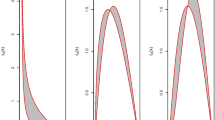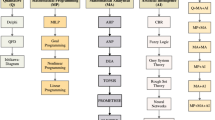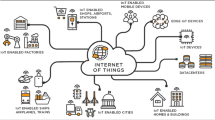Abstract
Nowadays, fuzzy cognitive maps (FCMs) are one of the most efficient artificial intelligence techniques for modeling large and complex systems. However, traditional FCMs have the limitation of not representing the indeterminacy situations presented in many decision-making problems. To overcome this limitation, neutrosophic cognitive maps (NCMs) were proposed as a new extension of traditional FCMs. Nevertheless, the way that NCMs reported in the bibliography handle the indeterminacy is still insufficient since they cannot quantify the degree of indeterminacy. Moreover, there are decision-making problems in which decisions should be considered as a sequence of decisions hardly interconnected in sequential order. This situation is presented in scenarios such as projects evaluation characterized by the existence of multiple interconnected processes (diagnosis, decision, and prediction). The lack of a suitable FCMs topology for modeling this kind of decision-making problems constitutes another challenging issue of FCMs. This paper presents a new neutrosophic cognitive map based on triangular neutrosophic numbers for multistage sequential decision-making problems (MS-TrNCM). In the proposed model, all the map’s connections are represented by triangular neutrosophic numbers, making it possible for decision makers to express their preferences considering the truth, indeterminacy, and falsity degrees. Furthermore, a new topology for representing multistage sequential processes is introduced. The suggested MS-TrNCM is applied to make diagnoses, decisions, and predictions during the evaluation of 1011 projects records from project evaluation database ”uci-gp-eval-201903051137” provided by the University of Informatics Sciences. In validation process, the superiority of the proposed MS-TrNCM over the NCMs and traditional FCMs has been demonstrated.

















Similar content being viewed by others
References
Kosko, B.: Fuzzy cognitive maps. Int. J. Man Mach. Stud. 24, 65–75 (1986). https://doi.org/10.1016/S0020-7373(86)80040-2
Amirkhani, A., Papageorgiou, E.I., Mohseni, A., Mosavi, M.R.: A review of fuzzy cognitive maps in medicine: taxonomy, methods, and applications. Comput. Methods Progr. Biomed. 142, 129–145 (2017)
Christoforou, A., Andreou, A.S.: A framework for static and dynamic analysis of multi-layer fuzzy cognitive maps. Neurocomputing 232, 133–145 (2017). https://doi.org/10.1016/j.neucom.2016.09.115
Papageorgiou, E.I., Poczeta, K.: A two-stage model for time series prediction based on fuzzy cognitive maps and neural networks. Neurocomputing 232, 113–121 (2017)
Nápoles, G., Leon Espinosa, M., Grau, I., Vanhoof, K., Bello, R.: Fuzzy Cognitive Maps Based Models for Pattern Classification: Advances and Challenges. In: Pelta, D.A., Cruz Corona, C. (eds.) Soft Computing Based Optimization and Decision Models: To Commemorate the 65th Birthday of Professor José Luis “Curro” Verdegay, pp. 83–98. Springer International Publishing, Cham (2018)
Felix, G., Nápoles, G., Falcon, R., Froelich, W., Vanhoof, K., Bello, R.: A review on methods and software for fuzzy cognitive maps. Artif. Intell. Rev. 52, 1707–1737 (2019). https://doi.org/10.1007/s10462-017-9575-1
Stylios, C.D., Bourgani, E., Georgopoulos, V.C.: Impact and Applications of Fuzzy Cognitive Map Methodologies. In: Kosheleva, O., Shary, S.P., Xiang, G., Zapatrin, R. (eds.) Beyond Traditional Probabilistic Data Processing Techniques: Interval, Fuzzy etc. Methods and Their Applications, pp. 229–246. Springer International Publishing, Cham (2020)
Anninou, A.P., Groumpos, P.P., Panagiotis, P.: Modeling Health Diseases Using Competitive Fuzzy Cognitive Maps. In: Papadopoulos, H., Andreou, A.S., Iliadis, L., Maglogiannis, I. (eds.) Artificial Intelligence Applications and Innovations, pp. 88–95. Springer, Berlin (2013)
Büyükavcu, A., Albayrak, Y.E., Göker, N.: A fuzzy information-based approach for breast cancer risk factors assessment. Appl. Soft Comput. 38, 437–452 (2016)
Douali, N., Csaba, H., De Roo, J., Papageorgiou, E.I., Jaulent, M.-C.: Diagnosis support system based on clinical guidelines: comparison between case-based fuzzy cognitive maps and bayesian networks. Comput. Methods Progr. Biomed. 113, 133–143 (2014)
Zhang, Y., Qin, J., Shi, P., Kang, Y.: High-order intuitionistic fuzzy cognitive map based on evidential reasoning theory. IEEE Trans. Fuzzy Syst. 27, 16–30 (2019)
Salmeron, J.L., Palos-Sanchez, P.R.: Uncertainty propagation in fuzzy grey cognitive maps with Hebbian-like learning algorithms. IEEE Trans. Cybern. 49, 211–220 (2019)
Bourgani, E., Manis, G., Stylios, C.D., Georgopoulos, V.C.: Timed-fuzzy cognitive maps: an overview. In: 2016 IEEE international conference on systems, man, and cybernetics (SMC), pp. 4483–4488. IEEE, Budapest, Hungary (2016)
Nápoles, G., Mosquera, C., Falcon, R., Grau, I., Bello, R., Vanhoof, K.: Fuzzy-rough cognitive networks. Neural Netw. 97, 19–27 (2018). https://doi.org/10.1016/j.neunet.2017.08.007
Wang, J., Guo, A.Q.: Ensemble interval-valued fuzzy cognitive maps. IEEE Access 6, 38356–38366 (2018)
Stylios, C.D., Georgopoulos, V.C.: Fuzzy cognitive maps structure for medical decision support systems. In: Forging the New Frontiers: Fuzzy Pioneers II, pp. 151–174. Springer, Berlin (2008)
Judy, M.V., Soman, G.: Parallel fuzzy cognitive map using evolutionary feature reduction for big data classification problem. In: Mandal, J.K., Sinha, D. (eds.) Social Transformation—Digital Way, pp. 226–239. Springer, Singapore (2018)
Cogollo, J., Correa, A.: Modeling supply chain quality management using multi-layer fuzzy cognitive maps. In: 2019 IEEE international conference on fuzzy systems (FUZZ-IEEE), pp. 1–6. IEEE, New Orleans, USA (2019)
Amirkhani, A., Shirzadeh, M., Papageorgiou, E.I., Mosavi, M.R.: Fuzzy Cognitive Map for Visual Servoing of Flying Robot. In: 2016 IEEE International Conference on Fuzzy Systems (FUZZ-IEEE). pp. 1371–1376. IEEE, Vancouver, Canada (2016)
Alipour, M., Hafezi, R., Papageorgiou, E., Hafezi, M., Alipour, M.: Characteristics and scenarios of solar energy development in Iran: fuzzy cognitive map-based approach. Renew. Sustain. Energy Rev. 116, 109410 (2019). https://doi.org/10.1016/j.rser.2019.109410
Hajek, P., Froelich, W., Prochazka, O.: Intuitionistic fuzzy grey cognitive maps for forecasting interval-valued time series. Neurocomputing 400, 173–185 (2020)
Amirkhani, A., Nasiriyan-Rad, H., Papageorgiou, E.I.: A novel fuzzy inference approach: neuro-fuzzy cognitive map. Int. J. Fuzzy Syst.. 22, 859–872 (2020)
López-Bernabé, E., Foudi, S., Galarraga, I.: Mind the map? Mapping the academic, citizen and professional stakeholder views on buildings and heating behaviour in Spain. Energy Res. Soc. Sci. 69, 101587 (2020)
Irujo, J.A., Pérez-Ezcurdia, A.: Understanding top management’s decision-making on implementing project management systems—an exploratory study. Tech. Gaz. 24, 837–846 (2017)
Hafezi, M., Giffin, A., Alipour, M., Sahin, O., Stewart, R.A.: Mapping long-term coral reef ecosystems regime shifts: a small island developing state case study. Sci. Total Environ. 716, 137024 (2020)
Amirkhani, A., Papageorgiou, E.I., Mosavi, M.R., Mohammadi, K.: A novel medical decision support system based on fuzzy cognitive maps enhanced by intuitive and learning capabilities for modeling uncertainty. Appl. Math. Comput. 337, 562–582 (2018)
Kandasamy, W.B.V., Smarandache, F.: Fuzzy Cognitive Maps and Neutrosophic Cognitive Maps. Xiquan, New Mexico (2003)
Smarandache, F.: A Unifying Field in Logics: Neutrosophic Logic. Neutrosophy, Neutrosophic Set, Neutrosophic Probability. American Research Press, Rehoboth (1999)
Monda, K., Pramanik, S.: A study on problems of Hijras in West Bengal based on neutrosophic cognitive maps. Neutrosophic Sets Syst. 5, 21–26 (2014)
Gaurav, Kumar, M., Bhutani, K., Aggarwal, S.: Hybrid model for medical diagnosis using Neutrosophic Cognitive Maps with Genetic Algorithms. In: 2015 IEEE International Conference on Fuzzy Systems (FUZZ-IEEE). pp. 1–7. Istambul (2015)
Betancourt-Vázquez, A., Leyva-Vázquez, M., Perez-Teruel, K.: Neutrosophic cognitive maps for modeling project portfolio interdependencies. Crit. Rev. 10, 40–44 (2015)
Bhutani, K., Kumar, M., Garg, G., Aggarwal, S.: Assessing it projects success with extended fuzzy cognitive maps & neutrosophic cognitive maps in comparison to fuzzy cognitive maps. Neutrosophic Sets Syst. 12, 9–19 (2016)
Shanmugam, S., Preethi, J.: A study of early prediction and classification of arthritis disease using soft computing techniques. Int. J. Res. Eng. Appl. Manage. 3, 35–47 (2017)
Mayorga, C., Suarez, J., De Lucas, L., Vera, C., Leyva, M.: Analysis of technological innovation contribution to gross domestic product based on neutrosophic cognitive maps and neutrosophic numbers. Neutrosophic Sets Syst. 30, 34–43 (2019)
Ramalingam, S., Govindan, K., Vasantha, W.B., Broumi, S.: An approach for study of traffic congestion problem using fuzzy cognitive maps and neutrosophic cognitive maps-the case of Indian traffic. Neutrosophic Sets Syst. 30, 273–283 (2019)
Vasantha, W.B., Kandasamy, I., Devvrat, V., Ghildiyal, S.: Study of imaginative play in children using neutrosophic cognitive maps model. Neutrosophic Sets Syst. 30, 241–252 (2019)
Deli, I., Subas, Y.: Single valued neutrosophic numbers and their applications to multicriteria decision making problem. Neutrosophic Sets Syst. 2, 1–13 (2014)
Wang, H., Smarandache, F., Zhang, Y., Sunderraman, R.: Single valued neutrosophic sets. Multispace Multistruct. 4, 410–413 (2010)
Zadeh, L.A.: Fuzzy sets. Inf. Control 8, 338–353 (1965)
Atanassov, K.T.: Intuitionistic fuzzy sets. Fuzzy Sets Syst. 20, 87–96 (1986)
Van Laarhoven, P.J.M., Pedrycz, W.: A fuzzy extension of Saaty’s priority theory. Fuzzy Sets Syst. 11, 229–241 (1983)
VLi, D.-F.: A ratio ranking method of triangular intuitionistic fuzzy numbers and its application to MADM problems. Comput. Math. Appl. 60, 1557–1570 (2010)
Liu, P., Wang, Y.: Multiple attribute decision-making method based on single-valued neutrosophic normalized weighted Bonferroni mean. Neural Comput. Appl. 25, 2001–2010 (2014)
Abdel-Basset, M., Mohamed, M., Hussien, A.-N., Sangaiah, A.K.: A novel group decision-making model based on triangular neutrosophic numbers. Soft. Comput. 22, 6629–6643 (2018). https://doi.org/10.1007/s00500-017-2758-5
Bueno, S., Salmeron, J.L.: Benchmarking main activation functions in fuzzy cognitive maps. Expert Syst. Appl. 36, 5221–5229 (2010)
Zhang, L., Chettupuzha, A.J.A., Chen, H., Wu, X., AbouRizk, S.M.: Fuzzy cognitive maps enabled root cause analysis in complex projects. Appl. Soft Comput. 57, 235–249 (2017)
Project Management Institute: A Guide to the Project Management Body of Knowledge (PMBOK®Guide), 6th edn. Project Management Institute, Newtown Square (2017)
Brioso, X.: Integrating ISO 21500 guidance on project management, lean construction and PMBOK. Proc. Eng. 123, 76–84 (2015)
Johnson, J.: CHAOS Report: Decision Latency Theory: It Is All About the Interval. The Standish Group, Morrisville (2018)
Project Management Institute: Capturing the Value of Project Management Through Decision Making. Project Management Institute, Morrisville (2015)
Rivero, C.C., Pérez, I., Piñero Pérez, P., Huergo, R.: Proceso de limpieza de datos en la construcción del repositorio para investigaciones en gestión de proyectos. In: Informática 2018, Cuba (2018)
Martínez, L., Rodriguez, R.M., Herrera, F.: 2-Tuple Linguistic Model. In: Martínez, L., Rodriguez, R.M., Herrera, F. (eds.) The 2-tuple Linguistic Model: Computing with Words in Decision Making, pp. 23–42. Springer International Publishing, Cham (2015)
Author information
Authors and Affiliations
Corresponding author
Rights and permissions
About this article
Cite this article
Al-subhi, S.H., Papageorgiou, E.I., Pérez, P.P. et al. Triangular Neutrosophic Cognitive Map for Multistage Sequential Decision-Making Problems. Int. J. Fuzzy Syst. 23, 657–679 (2021). https://doi.org/10.1007/s40815-020-01014-5
Received:
Revised:
Accepted:
Published:
Issue Date:
DOI: https://doi.org/10.1007/s40815-020-01014-5




